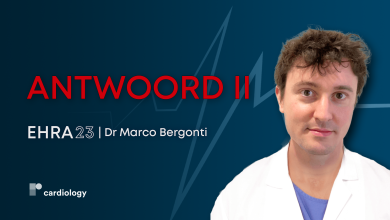Search results
Author(s):
Andreas Müssigbrodt
,
Gerhard Hindricks
Added:
3 years ago
Abstract
After the release of the 2010 guidelines of the European Society of Cardiology (ESC) and the 2011 update of the guidelines of the American Heart Association/American College of Cardiology (AHA/ACC), new evidence has emerged that requires adaption of current clinical practice in the treatment of atrial fibrillation (AF). In 2011, results were published from two central AF trials…
View more
Author(s):
Marco Bergonti
Added:
1 year ago
EHRA 23 - Dr Marco Bergonti (Istituto Cardiocentro Ticino, CH) to discuss the key takeaways from the ANTWOORD II Trial.
In this study, 605 heart failure patients undergoing atrial fibrillation ablation were enrolled to receive an ANTWERP Score, which aimed to predict LVEF recovery. 70% of patients were categorised as 'responders', patients identified as those who could benefit the most from AF…
View more
Implantable Cardiac Monitors for the Detection of Atrial Fibrillation - How Far Have We Come?
Author(s):
Christian Meyer
,
Martin Martinek
,
Helmut Pürerfellner
Added:
3 years ago
Article
Author(s):
Paul Wang
Added:
1 year ago
AHA 22: Dr Paul Wang (Cardiac Arrhythmia Service at Palo Alto, Stanford, CA, US) joins us remotely to discuss the findings of the ENHANCE-AF trial, originally presented at the American Heart Association's 2022 Scientific Sessions.
ENHANCE AF aimed to evaluate whether a shared-decision-making pathway tool would reduce the risk of stroke as a result of atrial fibrillation when compared to standard…
View more
Author(s):
Maria Cristina Beznă
,
Suzana Dănoiu
,
Marinela Beznă
,
et al
Added:
12 months ago
Author(s):
Mario DiazNuila-Alcazar
,
Daniel Valcárcel-Paz
,
Marcel Santaló-Corcoy
,
et al
Added:
3 years ago
Topic: 5. Secondary Prevention of Cardiovascular Disease.
Introduction
Coumadin therapy has been the best oral anticoagulation strategy available since several decades and is considered obligatory in some countries as the first strategy to be attempted because of economical reasons/arguments.
Objectives
To evaluate if patients already identified at highest-risk of stroke receive appropriate…
View more
Author(s):
Antoni Martínez-Rubio
,
Gheorghe-Andrei Dan
Added:
3 years ago
Are low doses of direct-acting oral anticoagulants justified and appropriate in patients with nonvalvular atrial fibrillation?
The novel direct-acting oral anticoagulants (NOACs) apixaban, dabigatran, edoxaban and rivaroxaban overcome most drawbacks of vitamin K antagonists and have proven efficacious and safe in well-designed multicentre randomised clinical trials.1–4 Furthermore, the…
View more
Author(s):
Fernando Worner
,
Cristina Marzo
,
Kristian Rivera
,
et al
Added:
3 years ago
Topic: 1. Clinical Cardiology
Introduction
Universal use of Directs Oral Anticoagulants (DOACs) in non valvular atrial fibrillation (nVAF) is not possible for economic reasons. Therefore, it is mandatory to guarantee their prescription of these drugs in patients theoretically most benefited.
Objectives
To review indications and results of one territorial, prospective and centralized…
View more
Author(s):
Jean-Paul Albenque
,
Arnaud Chaumeil
,
Stephane Combes
,
et al
Added:
3 years ago
In the setting of persistent atrial fibrillation (AF), the current ablation strategy combines pulmonary vein (PV) isolation and substrate modulation. Substrate modulation can be performed either by linear lesion deployment or by complex fractionated atrial electrogram (CFE) elimination. These two substrate modulation methods can be either exclusive or complementary. However, although the…
View more












 « First
« First